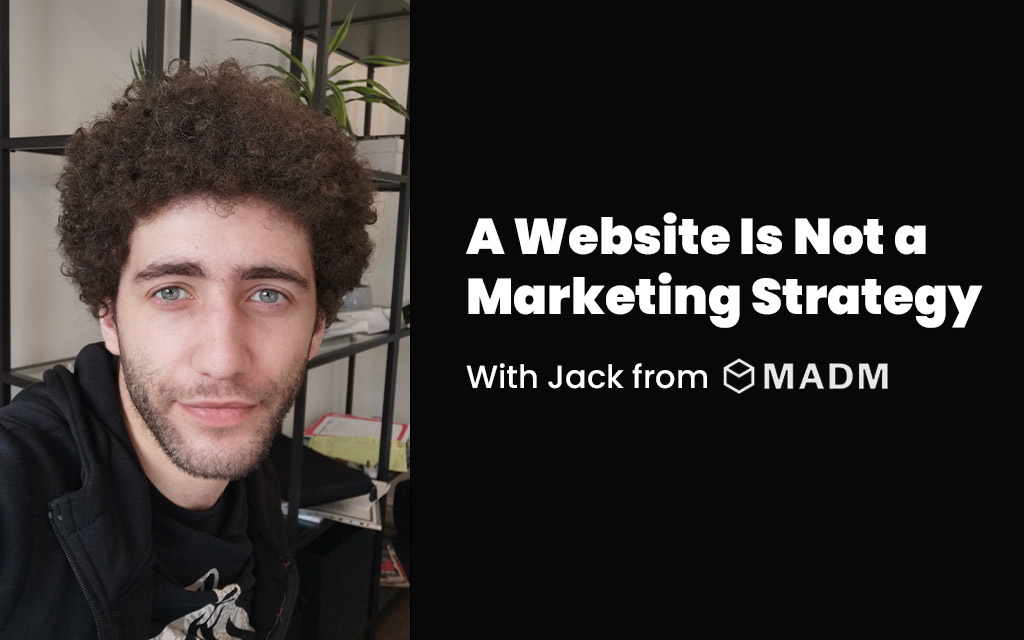A Website Is Not a Marketing Funnel.
Hey guys, It’s Jack here from MADM!
Right, let’s dive right into it – If I were to tell you that you don’t need a website for your business, would you believe me?
You might argue that a website is the quintessential part of any modern business. But you might struggle to answer why?
To answer that, we need to ask ‘What does a website actually do?’
Unfortunately, there’s no single answer to this as a website’s purpose varies from industry to industry. Some websites are designed to take payment and facilitate ecommerce, some are designed for the user to contact the sales team, some are designed to take bookings, etc etc.
Still, this is all well and grand but if nobody can find your website it won’t matter what it can do, how professional it is, or how well built it is. Even with optimal on page SEO, most websites aren’t just going to appear at the top of search engines.
Word of mouth is one of the most powerful forms of lead generation and many people might assume this is where their site-traffic will come from, and if word of mouth is your main lead-generator, your business isn’t likely to scale any time soon.
For many businesses, especially trade-work, word of mouth is enough to put food on the table. For plenty of other businesses, however, only an estimated 13% of sales come from word of mouth.
So where is the other 87% coming from?
An effective marketing strategy.
A website is always a good addition to a business – just having one makes you look more professional but it’s not a strategy in and of itself. A website is part of a strategy in the same way a brick is part of a wall.
What Is A Marketing Funnel?
A marketing funnel is your marketing strategy… or at the very least, it’s a large part of it.
A marketing funnel is different to a sales funnel but the phrases are often (incorrectly) used synonymously (you wouldn’t believe how many people think marketing and sales are the same thing!)
What Is The Difference Between a Marketing Funnel & A Sales Funnel?
A marketing funnel outlines the journey of a potential client or customer with the intention of enticing them to make a purchase in one way or another.
A sales funnel is the journey after the marketing funnel, for example, the onboarding process of a new client.
For service based industries, the marketing funnel typically ends when the customer sends a contact form request and the sales funnel begins when you phone or email back.
You Already Have A Marketing Funnel.
Whether you know it or not, if you’re trading, you have a funnel. Your specific funnel might not even include a website. Your marketing funnel could be a social media page that is ran well enough for people to find and message you. It could be that you post in local Facebook groups, which lead to phone calls or messages that lead into your sales funnel.
Even local brick and mortar stores with zero online presence or advertising budget still have a marketing funnel – the oldest form of marketing – the signpost above their shop.

What Does an Effective Marketing Funnel Look Like?
At MADM, we use a printed out infographic to explain marketing funnels to our clients. We’ve developed a more focused version, which uses websites and social media, as an example below (thanks for helping with this, Ant, our graphic designer!)
Point 1: How Will Your Customer Find You?
There are many ways a customer can find you, but using websites as an example, let’s look at the main two digital strategies to get your website found:
- SEO (Search Engine Optimisation).
- PPC (Pay Per Click) Campaigns.
Put simply, SEO works by creating quality content that people will want to engage with while also targeting keywords which will help search engines find the relevant audiences.
PPC campaigns are paid online advertising campaigns where you can pay to have your product showcased in one way or another.
Point 2: Where will you send them?
Once your business has been found by a potential customer, you’ll need to send them somewhere to receive more information, make a booking, purchase a product etc.
In our example we’re using a website or social media page, but it could easily be a physical location, an events page or something similar.
Point 3: What Do You Want The Customer To Do?

Once the prospective customer or client has found your business and have decided that they’re ready to make a purchase… how do they actually get a hold of their product?
With websites and social media, the two main systems are:
- Online Purchases.
- Contact Form/DM.
With online purchases, you might think the process ends here… but there’s still a few things you can do. An example of this is to create an email marketing campaign – if your customers can create an account on your website or are prompted to enter their email address, you’re able to add them to your email marketing subscriber list or ‘mailing list’
Targeted email campaigns can used to send out updates and even offers, promotions, or deals. Just be sure to get your customer’s permission first with a checkbox before adding anyone to a list!
Amazon.com actually uses their customer data to showcase recommended products that the user may be interested in by taking advantage of advanced data analytics systems.
In Conclusion
These points outlined above are the basic foundation of a strong digital marketing funnel.
Of course, it’s always going to be a good idea to have a website for your business, but it’s equally as important to understand why your website exists and how it can work for your business.
We’ve used websites and social media as our primary examples to help you understand marketing funnel basics, but there are numerous places a marketing funnel can occur – if you own a brick and mortar store, even a well designed sign on the front of your shop can act as a marketing funnel.
A Message from Multiko
The digital marketing experts at Make a Difference Marketing helped us to create this article. If you’re interested in learning more or feel you would benefit from some additional help with your digital marketing, give them a call on 0151 474 3268 or send an email to info@madmliverpool.co.uk
Did we miss something? Is there something we should add to this article? Get in touch with us at info@multiko.co.uk and we may credit you or your business with any changes you suggest.


